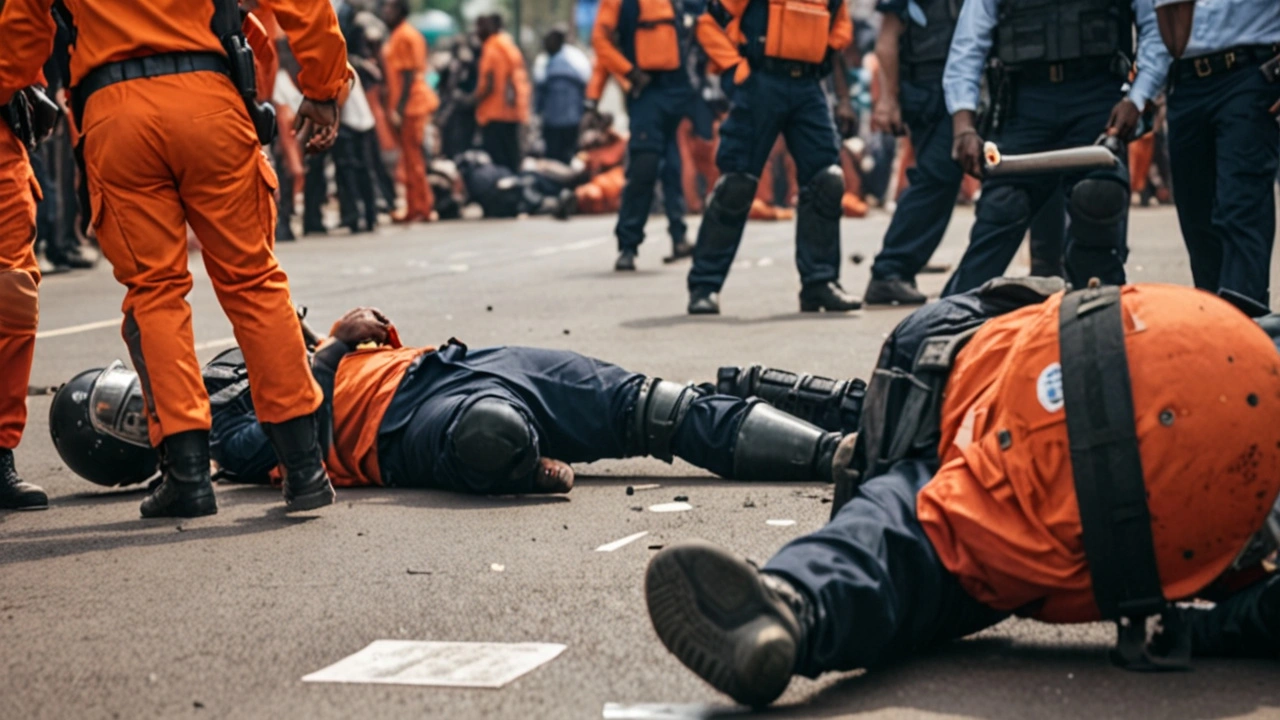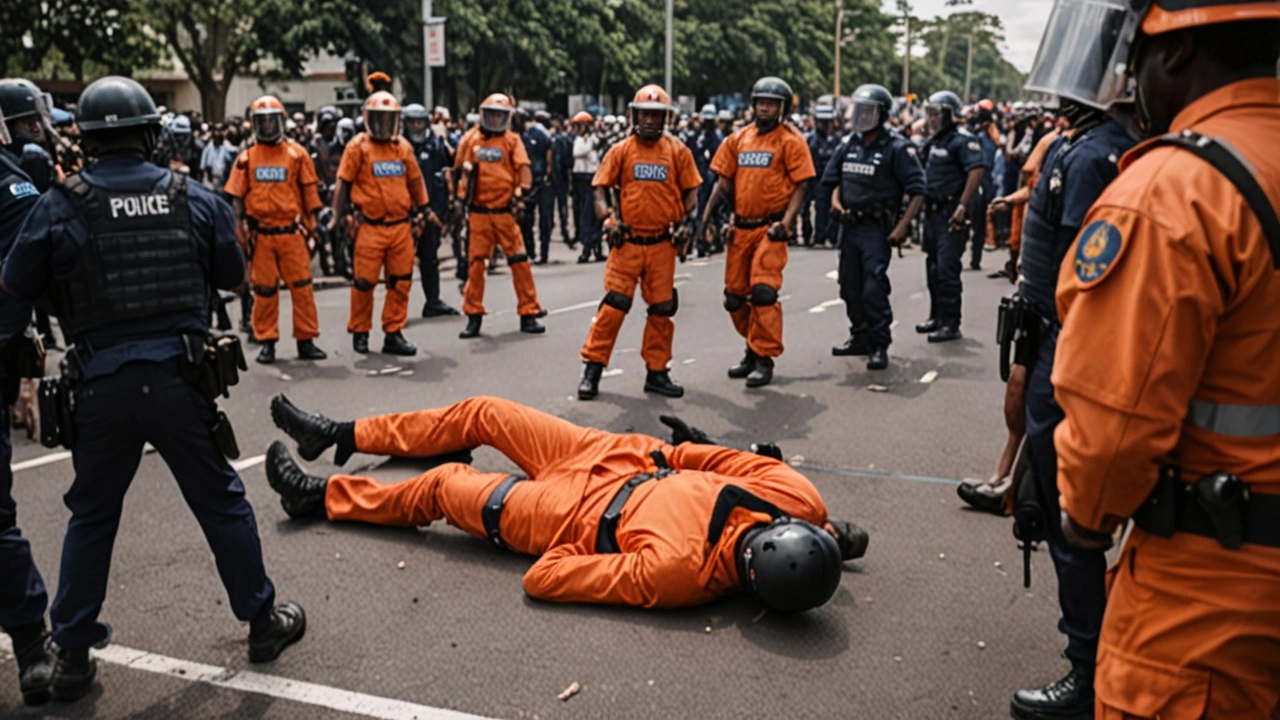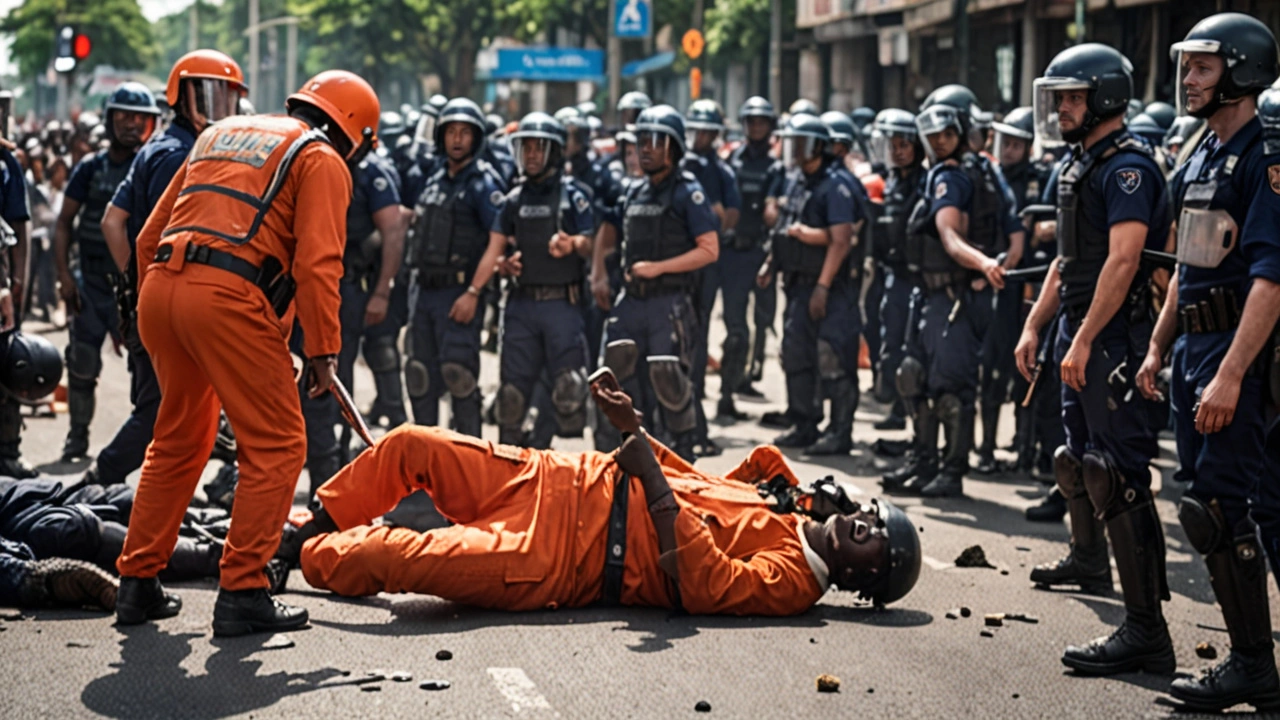Background to an Unfolding Crisis
Kenya's political landscape has been rapidly evolving, especially in light of the recent resignation of the country's police chief, Japhet Koome. This shock move comes after a series of protests against proposed tax increases turned deadly. The protests stretched over weeks and saw more than 40 people losing their lives in violent clashes.
Human rights organizations have spotlighted the police's role, accusing them of using excessive force by shooting, abducting, and arresting hundreds of protesters. These heavy-handed tactics have only added fuel to an already raging fire. The public outcry has been so intense that it has led to the swift dismissal of most of President William Ruto's cabinet, under mounting pressure from the demonstrators.

Protests and Escalation
The initial spark for the protests was a controversial finance bill aimed at alleviating Kenya’s worrying debt burden, which currently stands at over $80 billion. With around 60% of the nation's revenue going toward debt servicing, the government claimed that the tax hike was necessary to stabilize the economy. However, this explanation didn't sit well with the masses, especially when concerns about governmental waste and corruption remain unaddressed.
The tension reached a boiling point when protesters stormed the parliament building two weeks ago, a direct reaction to the lawmakers passing the much-criticized bill. In an attempt to control the situation, the police opened fire, further inciting outrage. Although President Ruto has since withdrawn the bill, the move has not placated the protesters, who are now demanding his resignation and broader reforms.
Leadership Changes and Government Response
In light of these events, the quick resignation of Police Chief Japhet Koome can be seen as both a response to his inability to control the protests without violence and as an effort to calm the rising public anger. Deputy police chief Douglas Kanja has already stepped in to fill the leadership vacuum, but it remains uncertain whether this change will lead to any meaningful reforms within the police force.
President Ruto has also taken significant steps to address the crisis. Not only has he sacked a majority of his cabinet, but he has also shown a willingness to engage in dialogue with the opposition. Recently, he met with opposition leader Raila Odinga, who has been a pivotal figure in the protest movement. The president announced the formation of a 150-member dialogue panel aimed at finding a viable solution to the country's mounting issues.

The Economic Context and Public Sentiment
Kenya’s economic woes play a significant role in this crisis. The debt burden has been a persistent issue, with the government’s revenue heavily earmarked for debt servicing, leaving little room for essential public services. This situation has been worsened by claims of governmental inefficiencies and corruption, which have further eroded public trust.
Protesters argue that instead of imposing additional taxes on the struggling population, the government should focus on reducing its own spending and rooting out corruption. In response to these demands, the presidency announced a series of austerity measures last week. However, these measures have yet to convince the public, who remain skeptical of the government’s commitment to meaningful change.
The public sentiment has been influenced substantially by young Kenyans who have harnessed the power of social media to coordinate and amplify their protest movement. This younger generation has been particularly vocal about the need for systemic changes, focusing on issues of governance, transparency, and accountability.
The Way Forward
The Kenya crisis serves as a potent reminder of the complexities and challenges that come with economic reform in the face of widespread public discontent. The government’s efforts to address the immediate concerns—such as the resignation of key officials and the initiation of dialogue—are steps in the right direction, but they are not enough on their own.
Both the government and the protest movement need to engage in genuine dialogue that addresses not just the symptoms but the root causes of the discontent. Issues such as economic inequality, corruption, and governance shortcomings must be tackled head-on. Only then can Kenya hope to move forward in a way that ensures long-term stability and prosperity for its citizens.
As Deputy Police Chief Douglas Kanja assumes his new role, all eyes will be on how the police handle future protests and whether there will be a shift towards more restrained and humane methods of crowd control. Simultaneously, the success of President Ruto’s dialogue panel will depend on its ability to include diverse voices and come up with actionable recommendations that can bring about real change.
In conclusion, the resignation of Police Chief Japhet Koome is a critical juncture in Kenya’s ongoing saga. Whether it leads to substantial reforms and a more just society remains to be seen. What is clear, however, is that the people's demand for accountability and justice is louder than ever, and ignoring it is no longer an option.

James Lawyer
July 13, 2024 AT 21:46Considering the recent resignation of Kenya’s police chief, it is evident that the state’s security apparatus is under unprecedented strain. The government's decision to withdraw the finance bill appears to be a reactive measure rather than a strategic one. Moreover, the deployment of lethal force against civilians raises serious concerns about adherence to international human rights standards. A thorough review of police protocols, coupled with transparent investigations, could restore a degree of public confidence. Ultimately, sustainable economic reforms must be pursued alongside institutional accountability.
Abby Culbertson
July 13, 2024 AT 21:56i cant belive how messed up dis is lol
Awolumate Muhammed Abayomi
July 13, 2024 AT 22:06Yo fam, the whole situtation looks like a big mess but we can bld togethr n fix it! It's clear that the gov gotta step up and stop the killin, ya know? The youths are already out there rallyin for real change. Lets hope the new deputy chief learn from past mistakes and keep the peace. All we need is some real action not just talk.
Josh Tate
July 13, 2024 AT 22:16Man, it's heartbreaking to see so many lives lost over a tax debate. The anger on the streets feels justified when people are squeezed by debt and corruption. I’m hoping the dialogue panel actually listens to those voices instead of just checking a box. If the police can shift to less violent crowd control, maybe the tension will ease.
John Smith
July 13, 2024 AT 22:26Everyone forgets that Kenya’s debt-to-GDP ratio has hovered around 70% for years, so the finance bill was never a surprise to seasoned analysts. The real issue is the chronic misallocation of resources, not the tax rate itself. The resignation of Koome merely masks deeper structural failures within the security sector. Without sweeping reforms, any new chief will face the same pressures.
Alex Soete
July 13, 2024 AT 22:36Alright folks, let’s turn this crisis into a catalyst for positive change! We’ve got a rare moment where the whole nation is watching-use that energy to demand transparency. Push the dialogue panel to include grassroots reps, and keep the conversation loud and clear. Together we can reshape the future, so keep the momentum going!
Cara McKinzie
July 13, 2024 AT 22:46Wow, another political soap opera and we’re all supposed to applaud the “reforms.” Honestly, this feels like a staged performance where the actors never learn their lines. The public’s frustration is just a backdrop for the elite’s power games. I’m bored of the same old promises that never deliver.
Joseph Conlon
July 13, 2024 AT 22:56It is undeniable that the current upheaval in Kenya is a symptom of a much larger systemic malaise that has festered for decades, a malaise that cannot be remedied simply by swapping out one police chief for another. The historical pattern of deploying heavy-handed tactics to quell dissent has repeatedly demonstrated that such an approach only deepens mistrust and fuels further instability. While the resignation of Japhet Koome may be portrayed as a concession, it does not address the entrenched culture of impunity that has characterized the force’s interaction with civilians. Moreover, the government's decision to retract the contested finance bill, although a tactical retreat, does little to assuage the underlying grievances surrounding fiscal transparency and corruption. The youth, who have harnessed the power of social media, represent a demographic that is increasingly intolerant of tokenistic reforms and demands substantive policy shifts. Their mobilization has exposed the chasm between rhetoric and reality, a chasm that has widened with each unfulfilled promise. In parallel, the creation of a 150‑member dialogue panel, while ostensibly inclusive, risks becoming a bureaucratic echo chamber unless it is truly representative of the diverse voices on the ground. The presence of opposition figures alone does not guarantee meaningful deliberation; the panel must proactively engage community leaders, civil society, and even dissenting youth groups. If the panel succumbs to procedural inertia, it will merely serve as a veneer of legitimacy for the status quo. The economic dimensions of the crisis cannot be ignored either; a debt burden surpassing $80 billion places extraordinary strain on public finances, yet austerity measures alone will not rectify the misallocation of resources. Instead, a comprehensive audit of government expenditures, coupled with stringent anti‑corruption safeguards, is essential to rebuild public trust. The potential for a constructive outcome hinges on the willingness of both the executive and the security apparatus to adopt restraint, transparency, and accountability. Should the police under Deputy Chief Douglas Kanja adopt community‑oriented policing models, the likelihood of future violent confrontations could be markedly reduced. Conversely, a continuation of the current heavy‑handed paradigm would almost certainly reignite the protests. In sum, the resignation of the police chief is a symbolic gesture that must be accompanied by concrete, systemic reforms if Kenya hopes to emerge from this impasse with its social fabric intact.
Mohit Singh
July 13, 2024 AT 23:06The so‑called “efforts” by the administration feel like a half‑hearted attempt to appease angry crowds while still protecting the interests of the elite. It’s as if they want to appear responsive without actually relinquishing any real power. One hopes the new deputy chief will finally learn the difference between policing and oppression. Until then, the cycle of protest and repression will keep spinning.
Damian Liszkiewicz
July 13, 2024 AT 23:16Thank you for that thorough breakdown, Joseph. 🌍 It really highlights how interconnected the economic and security issues are, and I appreciate the call for genuine inclusion in the dialogue panel. Let’s keep pushing for a process that truly hears the grassroots voices. 🙏
Angela Arribas
July 13, 2024 AT 23:26While the sentiment is commendable, there are several grammatical inaccuracies that need addressing: “efforts” should be singular in this context, and “keep pushing” is better phrased as “continue pushing.” Precision in language reflects precision in thought. :)